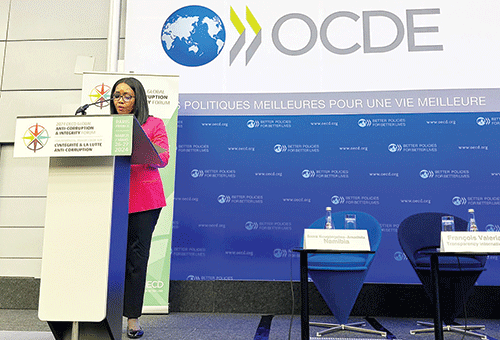Prime Minister Saara Kuugongelwa-Amadhila has chronicled Namibia’s fight against corruption and warned that new and evolving challenges are emerging, including the increasing use of technology in illegal schemes.
She said cybercrime and other digital threats are becoming more sophisticated and complex to detect.
“Since its independence, Namibia has made significant progress in strengthening measures to combat corruption and promote effective governance. This progress has been achieved through the enhancement of processes, systems and institutions within the public sector,” observed Kuugongelwa-Amadhila at the Anti-Corruption and Integrity Forum in Paris, France.
The event started yesterday and ends today, bringing leaders from around the world to share new thinking and insights, and to explore how anti-corruption policies and integrity frameworks can enhance responses to global corruption challenges. The forum is organised by the Organisation for Economic Co-operation and Development (OECD).
She said: “In 2003, the Anti-Corruption Act 2003 (Act No. 8 of 2003) was passed, and came into effect in 2005. Subsequently, in 2006, the Anti-Corruption Commission was established with the mandate to investigate allegations of corrupt practices, educate the public on the dangers of corruption, and take corruption-preventative measures in both the public and private sectors.”
The PM noted that since its inception, the commission has submitted 768 dockets to the prosecutor general’s office, with 343 cases having been concluded in the courts by the 2022/2023 financial year.
Namibia has also enacted the Whistleblower and Witness Protection Acts, and established an independent Financial Intelligence Centre.
Kuugongelwa-Amadhila cautioned nations to remain vigilant, and work together to harmonise laws, share information and coordinate enforcement efforts. The forum also marked the 25th anniversary of the Anti-Bribery Convention, a cornerstone in the global fight against corruption and a catalyst for policy change.
She said: “Various initiatives have been implemented to enhance the efficiency of judiciary management systems in the country, and strengthen the integrity and transparency of the Judiciary. For instance, court-connected mediation has been available in the High Court of Namibia since 2014.”
The lawmaker stated that superior courts have directives in place to manage cases promptly once they are placed on the court rolls, and judges oversee the management of cases and set timelines for their resolution from inception to finalisation.
Kuugongelwa-Amadhila said increased transparency, robust regulatory frameworks and enhanced monitoring mechanisms are crucial to prevent and detect illicit financial activities through which large amounts of resources are siphoned out of mainly natural resources- endowed countries.
“Many of these developing countries, a large part of whose populations are poor, are forced as a result of this into high and unsustainable debt. Sharing capacity for strengthening anti-corruption measures, including in the area of strengthening the governance framework, enhancing financial intelligence capabilities, promoting information-sharing and holding perpetrators accountable are vital steps in curbing illicit financial flows,” she highlighted.
In addition, there were panel discussions the PM took part in, which included the exploration of connections between integrity and the major challenges facing democracies soon.
Experts discussed, at length, how foreign interference, artificial intelligence and climate change will develop in the coming years, inviting participants to reflect on how integrity risk is likely to change, and how integrity frameworks will need to be strengthened to enable democracies to continue to safeguard prosperity.
Namibian ambassador to France, Mónaco, Portugal, Spain and Italy, Albertus Aochamub told New Era yesterday that this impressive progress over the past 34 years is buttressed by increased transparency in Namibia’s governance architecture.
“It is part of the African success story we are sharing today with researchers, policymakers, regulators and other participants at the 2024 OECD Global Anti-corruption and Integrity Forum,” stated the diplomat, who also serves as the permanent delegate to Unesco.
Aochamub noted that the Prime Minister was invited as the only African head of administration to open the meeting and forum in Paris.
“This special honour is bestowed on her in part as recognition by the OECD of the deep and concrete progress we have made in the fight against corruption through effective legal and policy measures,” he stated.



